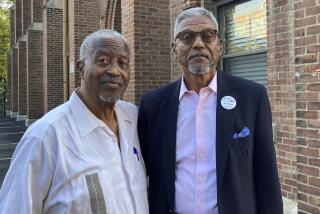A Government Study Gone Bad
- Share via
HBO’s new movie, “Miss Evers’ Boys,” examines one of the saddest chapters in American history.
Adapted by Walter Bernstein (“The Front”) from David Feldshuh’s Pulitzer Prize-nominated 1989 play, “Miss Evers’ Boys” chronicles the story of how the U.S. government withheld treatment for 40 years from a group of African American men infected with syphilis, in order to study the course of the disease.
The Tuskegee Study of Syphilis in the Untreated Negro Male (1932-’72), which was based on a 1896-1910 study of 1,000 white males in Oslo, Norway, began in the rural area of Macon County, Ala. The patients selected for the U.S. Public Health Service study, which was conducted by both white and black doctors, included 400 who had syphilis and 200 who didn’t. Back in 1932, there was an epidemic of syphilis among African American men and this study promised the poor, generally uneducated participants hot meals, burial stipends, tonics and vitamins.
The study continued to be funded by the government long after penicillin was available as a cure. Only 120 men were surviving when the study came to a halt in 1972 after the Associated Press broke the story.
Alfre Woodard stars as Miss Evers, the nurse who stayed with the project even when she knew the men could be cured; Joe Morton plays the Tuskegee scientist who ran the study; and Laurence Fishburne, who also is an executive producer, plays Evers’ boyfriend, who finds the study morally and ethically wrong.
Miss Evers is based on a real woman, Eunice Rivers, who stayed with the study for the entire 40 years and was a liaison between the men and the doctors. All the other characters are fictional.
Both executive producer Robert Benedetti and director Joseph Sargent (“Miss Rose White,” “Streets of Laredo”) say a challenging, complex movie like “Miss Evers’ Boys’ would never air on network TV these days.
“Once in a while the networks will do as a special event something worthwhile,” Benedetti says, “but generally if I get a piece of material like this as producer, I immediately think cable.”
“The networks have abdicated,” says Sargent, who also directed “Mandela and De Klerk,” airing Sunday on Showtime. “Their main diet has become fat-free, caloric-free stuff.”
Benedetti was thrilled that the pay-TV network didn’t want to dilute the play’s intensity. “I was very happy to say that [HBO] was insistent that we not reduce the moral ambivalence [of the piece],” he says.
“The lead characters are somewhat ambivalent,” he adds. “You don’t know whether what they have done is right or not. Usually for television, you like to have fairly simple moral issues. You like to have good guys and bad guys. This is a situation where there were no good guys and no bad guys. The real villain is institutionalized racism, rather than any particular person.”
While what the black doctors and nurses did was reprehensible in many ways, Benedetti relates, they initially believed they were helping the men, as well as getting the opportunity to prove to the medical community that blacks were not medically or biologically different from whites.
“But when penicillin comes along and they are now about 14 years into the study, they decide to withhold it and that’s when it really turned ugly,” Benedetti says.
“The only way to understand it, I think, is in the context of the medical ethic of the day, in which a statistical benefit was sufficient to outweigh the rights of an individual.”
Sargent was drawn to the project because “it’s not just a piece about a racial decision by a white government bureaucracy. It also reveals the unwitting collaboration of several black doctors and nurses, and that’s what gives dimension to this piece. It gives it a lot more substance.”
The film, Sargent says, does not point a finger at “one heavy. Of course, we realize there are no heavies at all. Basically, everyone had good intentions. Miss Evers is making the best of a terrible situation, and the inner struggle that produces makes the thing so dramatic.”
Woodard acknowledges that she initially didn’t want to play Miss Evers because she didn’t feel like entering the “mind-set of a person who could be duped this way and then, in turn, sort of carry the banner [of the study]. The reason I couldn’t not do it was, I was going to be playing this person opposite Laurence, and you can’t walk away from a character who is so complex. The exercise is to stay out of the way and don’t bring your opinions into it and really find out what this person was thinking.”
Woodard says she doesn’t think Miss Evers felt guilty for not doing more for her “boys.”
“I think that’s why she was able to do it all of those years,” she says. “[To her] these field hands, who have never been given the time of day, even by black people around them, that were a class above them, these guys were getting vitamins and tonics and things that even black people with jobs didn’t get. They were getting this specialized attention. She’s a smart woman and she had to have a smart logical reason [to do what she did].”
Benedetti says one of the most important points the movie makes is that the Tuskegee Study was never a medical or government secret.
“This was something that had to be funded; there had to be an appropriation for it by Congress every year for 40 years. This is partly about how bureaucratic health programs get started and then it’s impossible to stop them. Like Miss Evers says [in the movie], because they were black, the government considered them expendable. Nobody cared.”
“Miss Evers’ Boys” airs Saturday at 9 p.m. on HBO.
More to Read
The complete guide to home viewing
Get Screen Gab for everything about the TV shows and streaming movies everyone’s talking about.
You may occasionally receive promotional content from the Los Angeles Times.







